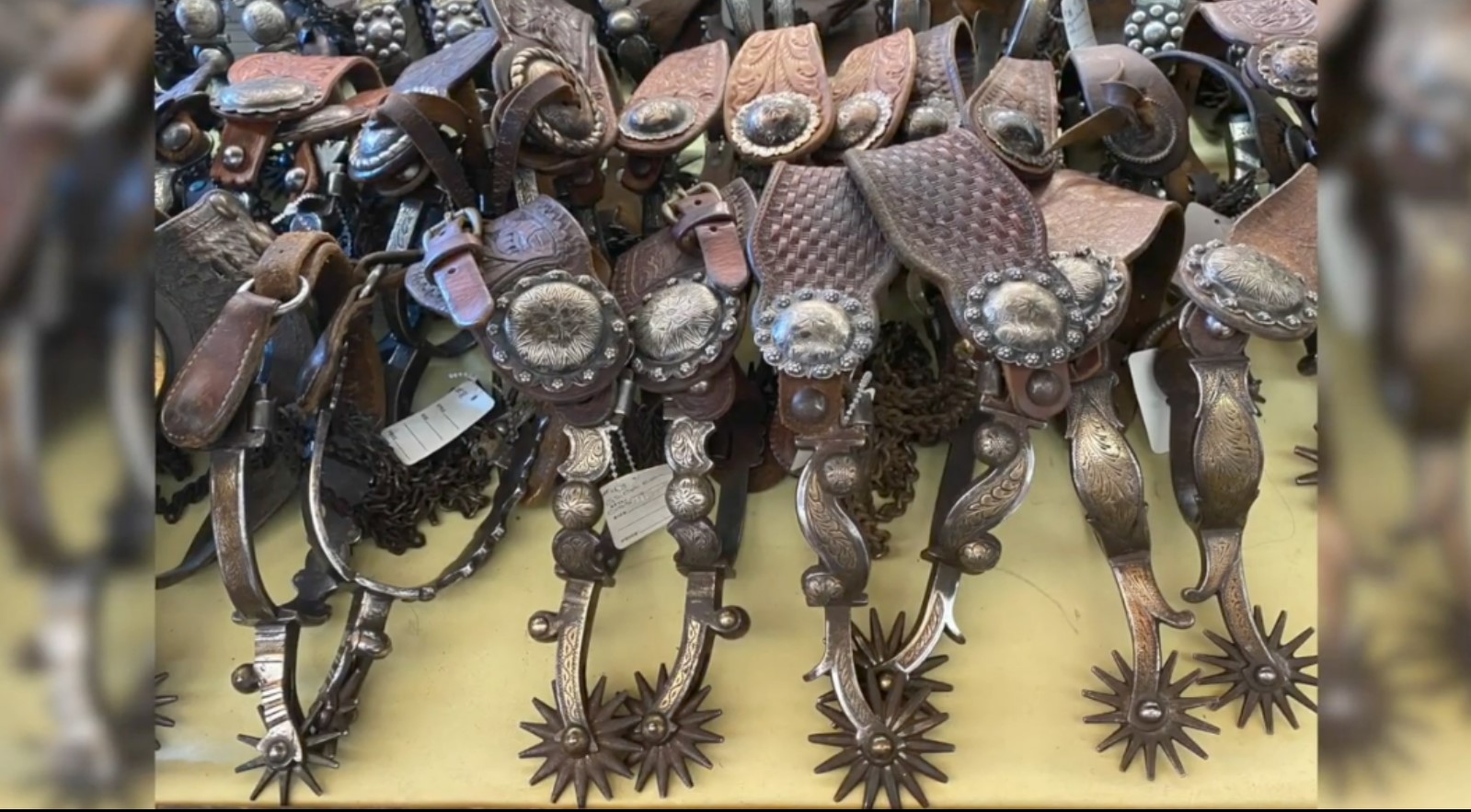Cowboy Spurs – History and Lineage
Posted by Jim Olson on Oct 27th 2022

Spurs! Are they simply a tool used as a signal between horse and rider? Are they cowboy bling to be shown off and collected? Or perhaps instruments of torture? Depending on how they are used—and who you talk to—they can be all three.
The history and lineage of spurs is an important place to start—and it looks a bit like this: People have been using spurs just about as long as they have been riding. We know there are examples from the Celts and Romans. European horsemen used them widely in the middle ages. Pretty much every horse culture, who also had knowledge of forging metal, used them. They first came across the Atlantic Ocean into the North American continent in two ways; with the British, who brought them to the Northeastern part of what is now the United States, and with the Spaniards, who brought them into “New Spain” or what is now Mexico.
The Spanish style spur was much larger and more ornate than those used by other Europeans, and the lineage of today’s Western style spur follows more closely with the Spaniard’s version. The Spanish-style spur made it's way north into the American Southwest with the Conquistadores and other explorers. These expeditions then left behind herdsmen to establish settlements and tend to livestock all across what is now northern Mexico and the American southwest. These herdsmen transitioned over time into what eventually became known as the Mexican vaqueros. The descendants of these early settlers were already tending to livestock when the first Americans came along and started learning how to ranch on open ranges during the infancy of the cowboy era in the 1800s. History tells us the Vaquero had a lot of influence over early cowboy gear—and the spur is no exception.
The best horseman in the world understands that a pair of spurs is little more than a signaling tool between horse and rider. Vaqueros had become fine horsemen during the couple-hundred-year period between when the Spanish first introduced livestock to the area up until the Americans came along and started developing their own ranches. During that time, a horseback culture had evolved to a level never seen before. It was not uncommon for a vaquero to be at a level of horsemanship whereby he would show off by removing the bridle from his horse and perform difficult maneuvers using nothing more than body signals to guide his mount. It takes a highly trained animal to perform like this, and a pair of spurs is one-way signals that are passed from rider to horse. If a rider is abusive with spurs, naturally, his mount would run off or buck and not perform at a high level of control. So to an expert horseman, a pair of spurs are definitely a signaling tool.
On the other hand, a pair of spurs worn by the wrong rider can be used as an instrument of pain and can be a danger to both the horse and rider. Unknowledgeable people look at a pair of spurs (especially ones with large rowels) and imagine the worst. They don’t realize that spurs, just like most anything else, can be used for bad or good depending on the user and application. For example, a butter knife can be used to butter your bread or to commit murder. A car can get your child to the doctor, or it can be used in a robbery. And spurs can be used to signal a horse or to harm one. It is how the instrument is used that matters, and a pair of spurs to an experienced rider are useful tools—not items of torture.
Today, there are numerous collectors from all parts of the world who collect spurs. To many, they are collectibles or even “cowboy bling.” Some spurs carry a pretty high price tag, and they are collected right along with many other forms of Western memorabilia. Among the most desirable spurs to an avid collector are antiques that have survived the test of time. If they were made by a well-known maker and are visually appealing (usually mounted with silver), they tend to be more valuable. However, modern-day cowboys also collect spurs from contemporary makers. It is like a badge of honor to wear fancy spurs by a sought-after spur maker. A pair of spurs by a well-known contemporary artisan can often match or exceed the value of a pair made by a famous maker from 100-plus years ago. It really comes down to the taste of the collector or user. The collector’s market remains very strong to this day for quality items, and many spurs are put into collections where they will be on display and never see actual use again.
Who would have thought that a tool used by horsemen for over 2000 years would evolve into a form of cowboy art? Those Celtic and Roman blacksmiths would likely be amazed that the simple, almost crude, forms of spurs they used to make would evolve into an art form that can nowadays sell for many thousands of dollars!
Finally, because of the dollar amount commanded by certain spur makers, of course, there are folks with low morals who will try to sell an inferior pair as being one that is highly desirable. Fake hallmarks on spurs is not uncommon. The best rule is to always deal with reputable sellers and also to educate yourself. Not everyone gets it right all of the time, but an honest seller will not intentionally try to defraud someone, and on the rare occasion they get it wrong, they will make it right once the mistake is discovered. Always be cautious of a “buyer beware” situation when investing your hard earned money.
In Conclusion, collecting spurs can be a fun and interesting adventure. There is a lot to learn, and a lot of history will be available to you. New doors will be opened and friendships made. You are encouraged to give it a try! Happy collecting!
Jim Olson © 2022

